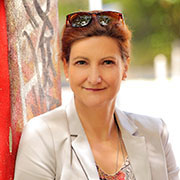For the Beethoven anniversary year 2020 Charlotte Seither has been commissioned to write a composition for chamber orchestra for the German Orchestra Competition. It is called “Ferne Begegnung”.
1. “Ferne Begegnung” is a work for the German Orchestra Competition chamber orchestra category of the German Music Council in Bonn. The commission was a double challenge – for the Beethoven anniversary year 2020 and for an orchestra you do not know. How do you approach this?
I find the task extremely exciting. Firstly it is always something special when a piece will be performed as a compulsory piece in a competition by several ensembles. The openness of such a process changes the imagination even when writing. Such a piece must indeed allow for different interpretations, but it must also give each individual ensemble the opportunity to present itself with its own particular kind of sound. The work has to be “elastic” enough – in its scoring too – so that all chamber orchestras can perform it. It must not be too difficult or too specialized. However, at the same time it must be distinctive, i.e. sufficiently approachable both in terms of sound and form, so that ensembles which are very good can stand out clearly from others. I always find such assignments very inspiring.
2. How should the reference to Beethoven be presented – musically, aesthetically?
In fact the reference to Beethoven preoccupied my for quite a while: such a piece cannot just be about stringing together quotations, or opening a kind of “pick and mix store”. There has to be a deeper level in which the reference to the composer also becomes a real encounter, develops into a true discourse. Perhaps that is also why the piece has the title Ferne Begegnung. Trois Adieux für Ludwig van B. Beethoven appears in it only from a distance, as if through a burning glass which becomes ever more blurred. The farewell, the three falling intervals from the beginning of the “Les Adieux” sonata are so greatly overstretched in the process that the reference to its actual context is increasingly lost and it then no longer sounds “Beethovenian”. “Adieux” [farewell] is less reminiscent here of the reference to a musical motif, it becomes the theme itself. I depart from it several times to new material, but in the process each farewell becomes a new reference. This paradox – the further I distance myself from Beethoven, the greater the closeness becomes – this opposite of the “distant encounter” interested me greatly in this piece.
3. Another work for orchestra: what is your sustained interest in this scoring?
I love the orchestra. For me, it is my very own place which – contrary to all clichées – allows the subjective and intimate to appear in a special way. Of course chamber music may appear “more intimate” at first glance, it involves only very few performers. In the contents, that is in the style of how inner emotion can be portrayed, in these depths of wordlessness, for me the orchestra can hardly be surpassed. For me this genre is an unending treasure trove to look and marvel at.
Interview by Marie Luise Maintz
(from [t]akte 1/2018)



